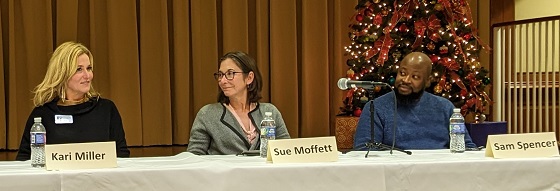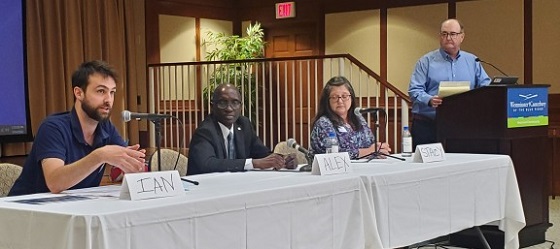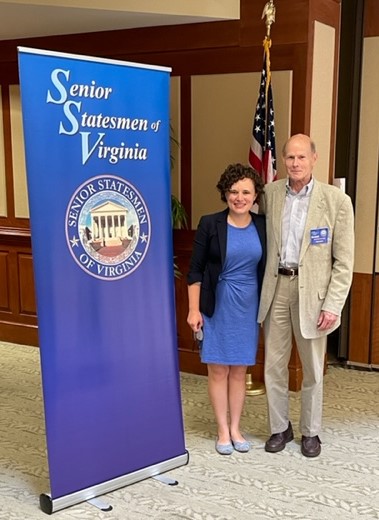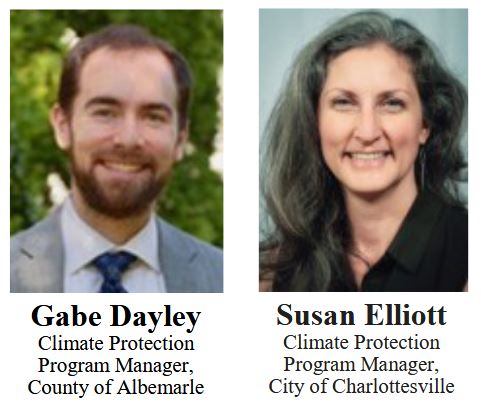How do we get our news today? Are we really so divided as a country as some politicians and pundits suggest? How are stories covered (or not) in the face of media consolidation? And just how healthy is journalism in Central Virginia?
Giles Morris, executive director of Charlottesville Tomorrow, Jim Spencer, editorial page editor for The Daily Progress, and Joe Thomas, morning host and program director of Monticello Media, were panelists for the SSV November program. Dan Schutte of CBS 19 had a family emergency and was unable to attend. Bob Beard who is a former news anchor with CBS 19 in Charlottesville and a longtime reporter in Washington, D.C., including CNN, NBC and Reuters, was moderator.

Giles Morris, Jim Spencer, Bob Beard and Joe Thomas at the forum
These speakers were all passionate about their profession and trying to find the truth in the current media environment. Charlottesville Tomorrow is a non-profit electronic presentation funded by grants and donations whose primary goal is to present information to the community from a pure journalistic perspective. Jim Spencer focused on the challenges of corporate ownership and employing adequate reporters to cover our area. He currently has a staff of three. Wondering who writes the Progress editorials? He does. Joe Thomas explained the News Talk show title by saying first they present the News, and then the Talk portion is devoted to analyzing it. He also made a plea for community members to support advertisers of local media. The program highlighted common issues all media are dealing with today and how they try to provide local citizens with accurate information from which individuals may make informed decisions.
Participants
Bob Beard, SSV board member, moderated the program. Bob has over 30 years of experience in broadcast journalism at markets throughout the U.S. He is a former news anchor with CBS 19 in Charlottesville and a longtime reporter in Washington, D.C., including CNN, NBC and Reuters. Bob has degrees from Vanderbilt and Georgetown. Bob and his wife, Ellen, live in Ivy, where they raised twin sons. They are new “empty nesters.”
Giles Morris is the executive director of Charlottesville Tomorrow. He has worked as a school teacher, community organizer, and a nonprofit program manager. He started working as a full-time journalist in 2007 as the general assignment reporter for the Rhinelander Daily News in Rhinelander, Wisconsin. Giles served as editor-in-chief of C-VILLE Weekly and later as vice president for marketing and communications at James Madison’s Montpelier, where he was instrumental in the rollout of the award-winning, descendant-driven slavery exhibition, “The Mere Distinction of Colour.” He holds an M.Div. degree from Harvard Divinity School and his journalism and digital storytelling projects have been recognized by INN, LION, AAN, the North Carolina Press Association, and the Virginia Press Association.
Dan Schutte is the news director of CBS-19 and anchors CBS19 News at 5 and FOX Virginia News at 10. He started at CBS19 in June of 2006. He met his wife Alison here, and they now have a little girl named Abby. Abby keeps the family on their toes. She loves swimming and the family dog Ripley. Ripley joined the family from the CASPCA in 2015. Dan comes to the area from Northern Minnesota, where he was an anchor for WDIO-TV in Duluth. Prior to that, he was a reporter and anchor in Eureka, California. During his career, he has covered several national stories and won awards for his work. Dan is originally from the Minneapolis area. He graduated from American University in Washington, D.C., with a degree in broadcast journalism. He was also a member of the Division I wrestling team there.
Jim Spencer is the editorial page editor for the Daily Progress and appears weekly on Beyond the Headlines, a weekly news analysis segment on CBS19 in Charlottesville. A Virginia native, Jim has been a journalist since 1974. He began his career at the weekly Virginia Gazette in Williamsburg doing everything from writing news, feature and sports stories to writing theater reviews, sports columns and unsigned editorials. He moved to the Norfolk Virginian Pilot moving from sports writer, to news reporter to feature writer. The Chicago Tribune hired him to write features and he returned home to the Virginia Peninsula to write a metro column for the Daily Press after the Tribune Company bought the paper. He moved to the Denver Post to write a metro column and then to the Minneapolis Star Tribune where he served for 10 years as a Washington correspondent.
Joe Thomas is a Program Director and Talk Host at Monticello Media based in Charlottesville. Previously, Joe was a Co-Founder, Operations at The Afternoon Constitutional and also held positions at Charlottesville-Albemarle Technical Education Center, Forever Media, Delmarva Broadcasting, iHeartMedia, and Audacy, broadcast and Internet radio platform.
 Denver Riggleman spoke about the disinformation and conspiricy theories that are pervading the public, and the damage that they do. A large percentage of the public believe this information and some extremest are acting in a destructive way. There was a good Q&A session, and the meeting was moderated by SSV Board Member Peyton Williams.
Denver Riggleman spoke about the disinformation and conspiricy theories that are pervading the public, and the damage that they do. A large percentage of the public believe this information and some extremest are acting in a destructive way. There was a good Q&A session, and the meeting was moderated by SSV Board Member Peyton Williams.

 Lo Davis is executive director of Cav Futures, the NIL collective at UVA. Prior to that he served 12 years in the role of associate director for the Virginia Athletics Foundation (VAF). During his time at VAF, Mr. Davis raised millions of dollars in support of Virginia Athletics. While at VAF, Mr. Davis supported several individual programs, including baseball, football, lacrosse, track and field and women’s basketball. He also served on several committees within the Advancement Community at UVA, including creating and acting as co-chair for the now annual Advancement Community Excellence Awards.
Lo Davis is executive director of Cav Futures, the NIL collective at UVA. Prior to that he served 12 years in the role of associate director for the Virginia Athletics Foundation (VAF). During his time at VAF, Mr. Davis raised millions of dollars in support of Virginia Athletics. While at VAF, Mr. Davis supported several individual programs, including baseball, football, lacrosse, track and field and women’s basketball. He also served on several committees within the Advancement Community at UVA, including creating and acting as co-chair for the now annual Advancement Community Excellence Awards. Harriet Kuhr
Harriet Kuhr Kari Anderson Miller
Kari Anderson Miller Sue Moffett
Sue Moffett Sam Spencer
Sam Spencer The panel discussed the successes and challenges of refugees and the programs attempting to meet the shared goal of refugees become self-sufficient members of their communities. NBC29 news coverage of the program can be viewed at
The panel discussed the successes and challenges of refugees and the programs attempting to meet the shared goal of refugees become self-sufficient members of their communities. NBC29 news coverage of the program can be viewed at


 Democratic candidate
Democratic candidate 


 Delegate Sally Hudson represents Albemarle (part) and Charlottesville, and serves on the Finance Committee and the Health, Welfare and Institutions Committee. In 2019, she became the first woman to serve Charlottesville in the Virginia State House. In her first term, she delivered high-impact legislation to address some of the most pressing challenges we face, from unemployment and evictions to essential health care coverage. As a labor economist, Sally has invested her career in securing the resources and opportunities that every family needs to thrive.
Delegate Sally Hudson represents Albemarle (part) and Charlottesville, and serves on the Finance Committee and the Health, Welfare and Institutions Committee. In 2019, she became the first woman to serve Charlottesville in the Virginia State House. In her first term, she delivered high-impact legislation to address some of the most pressing challenges we face, from unemployment and evictions to essential health care coverage. As a labor economist, Sally has invested her career in securing the resources and opportunities that every family needs to thrive.




 who is the Warner-Booker Distinguished Professor of International Law at the University of Virginia. Born and raised in Richmond, Virginia, Professor Howard is a graduate of the University of Richmond and received his law degree from the University of Virginia. He was a Rhodes Scholar at the University of Oxford, where he read philosophy, politics, and economics. After graduating from law school, he was a law clerk to Justice Hugo L. Black of the Supreme Court of the United States.
who is the Warner-Booker Distinguished Professor of International Law at the University of Virginia. Born and raised in Richmond, Virginia, Professor Howard is a graduate of the University of Richmond and received his law degree from the University of Virginia. He was a Rhodes Scholar at the University of Oxford, where he read philosophy, politics, and economics. After graduating from law school, he was a law clerk to Justice Hugo L. Black of the Supreme Court of the United States.